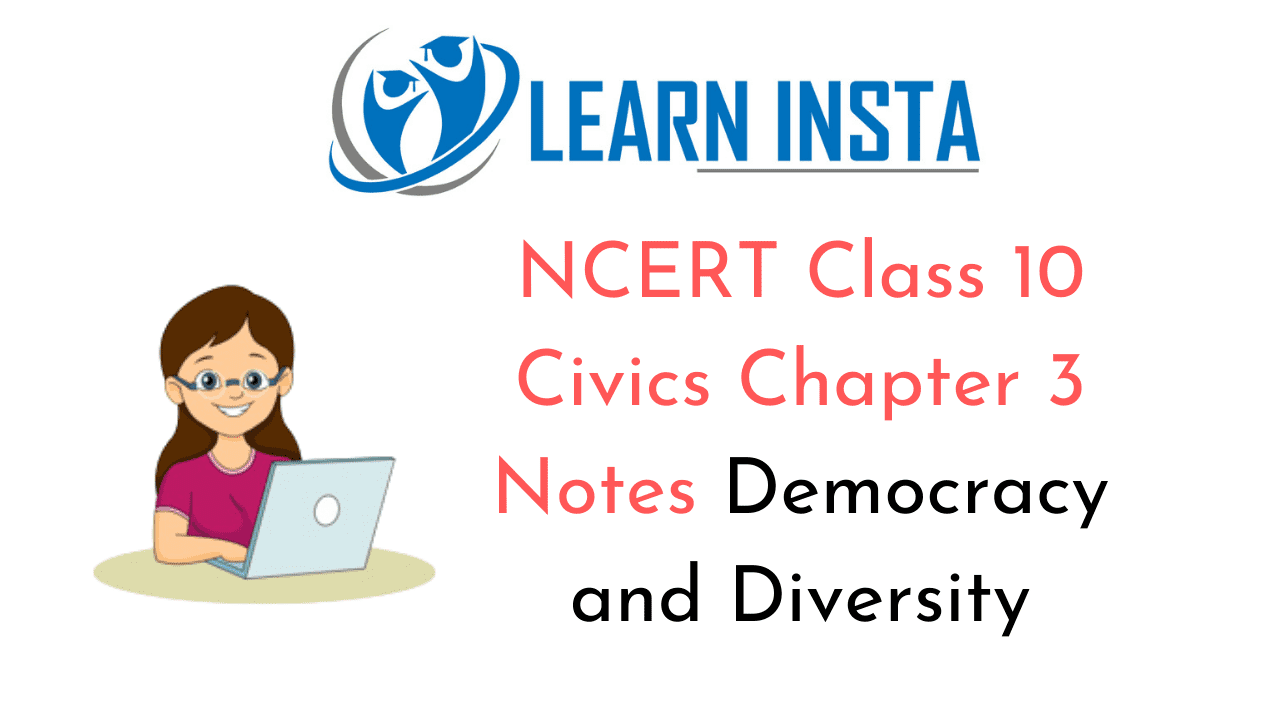 On this page, you will find NCERT Class 10 Civics Chapter 3 Notes Pdf free download. CBSE Class 10 Social Science Notes Civics Chapter 3 SST Democracy and Diversity will seemingly, help them to revise the important concepts in less time.
On this page, you will find NCERT Class 10 Civics Chapter 3 Notes Pdf free download. CBSE Class 10 Social Science Notes Civics Chapter 3 SST Democracy and Diversity will seemingly, help them to revise the important concepts in less time.
Democracy and Diversity Class 10 Notes Social Science Civics Chapter 3
CBSE Class 10 Civics Chapter 3 Notes Understanding the Lesson
1. Language and region are not the only features that give a distinct identity to people. Sometimes, people also identify themselves on the basis of their physical appearance, class, religion, gender, caste, tribe, etc.
2. In 1968 Olympics held at Mexico City, Tommie Smith and John Carlos, both African-Americans, won the gold and bronze medals respectively in 200 metres race. In the medal ceremony they received their medals wearing black socks and no shoes to represent black poverty. They did so because they wanted to draw international attention to racial discrimination in the United States.
3. The International Olympic Association held Carlos and Smith guilty of violating the Olympic spirit by making a political statement. Their medals were taken back. But their action gained international attention for the Civil Rights Movement in the US.
4. The athletes in the above example responded to social divisions and social inequalities which exist in almost all societies. Social diversity can take different forms in different societies.
5. Some social differences are based on accident of birth and some are based on our choices. But every social difference does not lead to social division. Social differences divide similar people from one another but they also unite very different people.
6. People belonging to different social groups share differences and similarities cutting across the boundaries of their groups. We all have more than one identity and can belong to more than one social group.
7. Social division takes place when some social difference overlaps with other differences. The difference between the Blacks and Whites becomes a social division in the US because Blacks are poor and discriminated against. In our country Dalits face discrimination and injustice. Situation of this kind produces social divisions.
8. If social differences cross cut one another, it is difficult to pit one group of people against the other. It means that groups that share a common interest on one issue are likely to be in different sides on a different issue.
9. Overlapping social differences create possibilities of deep social divisions and tensions. Cross-cutting social differences are easier to accommodate. Social divisions of one kind or another exist in most countries. It does not matter whether the country is small or big.
10. The combination of politics and social divisions is very dangerous. The competition among various political parties tends to divide any society. If they start competing in terms of some existing social divisions, it can make social divisions into political divisions and lead to conflict and tension in the country. So politics and social divisions must not be allowed to mix.
11. But every expression of social divisions in politics does not lead to disasters. Social divisions of one kind or another exist in most countries of the world. Wherever they exist, these divisions are reflected in politics.
18. Social divisions affect voting in most countries. People from one community tend to prefer some party more than others. But this does not lead to disintegration of the country.
19. Three factors that determine the outcomes of politics of social divisions are- how people perceive their identities, how political leaders raise the demands of any community and how the government reacts to demands of different groups.
20. The assertion of social diversities in a country need not be seen as a source of danger. In a democracy, political expression of social divisions can be healthy. This allows various disadvantaged and marginal social groups to express their grievances and get the government to attend to these.
21. But these people need to fight against the injustices. Such a fight often takes the democratic path, voicing their demands in a peaceful and constitutional manner and seeking a fair position through elections. Sometimes the struggle against inequalities takes the path of violence. However, democracy is the best way to fight for recognition.
Democracy and Diversity Class 10 CBSE Notes Important Terms
African-American: Descendants of Africans who were brought into America as slaves between the 17th century and early 19th century.
Homogeneous society: A society that has similar kinds of people, especially where there are no significant ethnic differences.
Migrant: Anybody who shifts from one region or country to another region within a country or to another country, usually for work or other economic opportunities.
Outcome: The result of an event.
Racism: A belief in the superiority of a particular race.